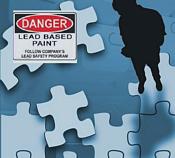Know the Difference Between RRP and Deleading To Avoid Breaking The Law
According to the Massachusetts Lead Law, any apartment unit or single family home with an occupant who is less than six years old must be deleaded. I bet if you are a Massachusetts resident you probably had no idea that this law existed. If you live outside of Massachusetts, you may want to find out if a similar law exists.
 Deleading under the MA Lead Law requires the removal or covering of lead paint hazards in homes built before 1978 where any children under six live. Lead paint hazards include loose lead paint and lead paint on windows and other surfaces accessible to children. Owners are responsible with complying with the law. This includes owners of rental property as well as owners living in their own single family home. After deleading is completed, homes are "lead-safe", not "lead-free." In Massachusetts, financial help to accomplish deleading is available through tax credits, grants and loans.
Deleading under the MA Lead Law requires the removal or covering of lead paint hazards in homes built before 1978 where any children under six live. Lead paint hazards include loose lead paint and lead paint on windows and other surfaces accessible to children. Owners are responsible with complying with the law. This includes owners of rental property as well as owners living in their own single family home. After deleading is completed, homes are "lead-safe", not "lead-free." In Massachusetts, financial help to accomplish deleading is available through tax credits, grants and loans.
Renovators need to understand that RRP work is not deleading. Your certification and or licensing to do RRP work does not qualify you to do deleading. If deleading is the customer’s purpose for doing the work, only a licensed deleader can do the work unless the property owner does the work himself. (If you are a MA property owner contemplating deleading work, see the note below)
 At a recent RRP Workshop I presented in Marlborough MA, one of the attendees, wanted to make sure that everyone in the room understood the difference between RRP work and deleading. In the video below Lawrence “Skip” Moran of Lawrence J Moran, a licensed deleader and remodeling contractor, offers some clarification to help renovators avoid potential violations, fines and or challenges with their customers. Although some of the terms Skip uses in the video may be specific to Massachusetts, renovators around the country should heed what he has to say and check into deleading laws where they work before offering or performing deleading services for clients and or doing deleading at their own rental properties
At a recent RRP Workshop I presented in Marlborough MA, one of the attendees, wanted to make sure that everyone in the room understood the difference between RRP work and deleading. In the video below Lawrence “Skip” Moran of Lawrence J Moran, a licensed deleader and remodeling contractor, offers some clarification to help renovators avoid potential violations, fines and or challenges with their customers. Although some of the terms Skip uses in the video may be specific to Massachusetts, renovators around the country should heed what he has to say and check into deleading laws where they work before offering or performing deleading services for clients and or doing deleading at their own rental properties

Note: In Massachusetts, an owner or agent (someone working for an owner without a deleader's license) can perform some specific tasks, but cannot begin any of those tasks until:
- The home is inspected by a licensed lead inspector
- The owner or agent is properly trained to perform the deleading work
For more information about what work may be done by an owner or agent and how to become trained, call the Childhood Lead Poisoning Prevention Program at 1-800-532-9571
For more information about RRP for landlords in MA, contact the MA Department of Occupational Safety (DOS) at 1-617-969-7177

 Looking for accurate information about the EPA RRP rule?
Looking for accurate information about the EPA RRP rule? 


